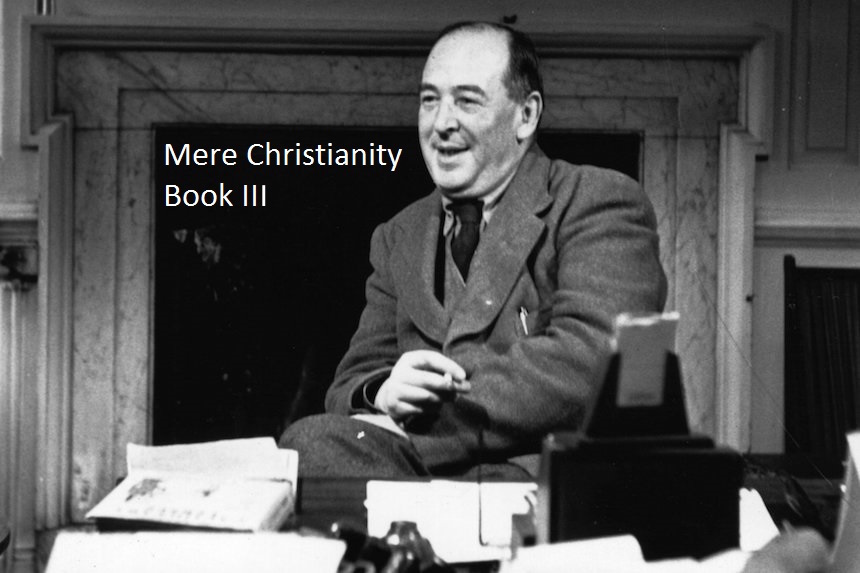Mere Christianity – Book III – Chapter 3 (“Social Morality”)


Picking back up my notes for C.S. Lewis’ “Mere Christianity”…
Notes & Quotes
1. Christ did not preach a brand new morality
“The Golden Rule of the New Testament (Do as you would be done by) is a summing up of what everyone, at bottom, had always known to be right… As Dr. Johnson said, ‘People need to be reminded more often than they need to be instructed'”
2. Christianity is not a political programme
(a) It is not a detailed set of rules
“…Christianity has not, and does not profess to have, a detailed political programme for applying “Do as you would be done by” to a particular society at a particular moment”
(b) It is, instead, meant to act as a guide
“It was never intended to replace or supersede the ordinary human arts and sciences: it is rather a director which will set them all to the right jobs, and a source of energy which will give them all new life…”
4. It is up to every Christian to bring the Golden Rule to his/her domain of responsibility and excellence
“…when they say that the Church should give us a lead, they ought to mean that some Christians – those who happen to have the right talents – should be economists and statesmen…[and] be directed to putting “Do as you would be done by” into action.
…Christian literature comes from Christian novelists and dramatists – not from the bench of bishops getting together and trying to write plays and novels in their spare time”
5. The New Testament hints at what a fully Christian society would be like
(a) It seems to be an odd mix
“We should feel that its economic life was very socialistic and, in that sense, ‘advanced,’ but that its family life and its code of manners were rather old-fashioned-perhaps even ceremonious and aristocratic”
(b) Few of us would like everything
“Each of us would like some bits of it, but I am afraid very few of us would like the whole thing… every one is attracted by bits of it and wants to pick out those bits and leave the rest. That is why we do not get much further: and that is why people who are fighting for quite opposite things can both say they are fighting for Christianity”
6. Greek, Jewish and Early Christian communities rejected usury
“…the ancient heathen Greeks, and by the Jews in the Old Testament, and by the great Christian teachers of the Middle Ages… told us not to lend money at interest: and lending money at interest – what we call investment – is the basis of our whole system. Now it may not absolutely follow that we are wrong…”
7. Charity is essential
“Charity – giving to the poor – is an essential part of Christian morality: in the frightening parable of the sheep and the goats it seems to be the point on which everything turns”
(a) Some may advocate for producing a society which doesn’t need charity
“They may be quite right in saying that we ought to produce that kind of society. But if anyone thinks that, as a consequence, you can stop giving in the meantime, then he has parted company with all Christian morality”
(b) We should probably give more than we do
“I do not believe one can settle how much we ought to give. I am afraid the only safe rule is to give more than we can spare… If our charities do not at all pinch or hamper us, I should say they are too small”
(c) Fear of insecurity is our greatest obstacle
“…the great obstacle to charity lies not in our luxurious living or desire for more money, but in our fear-fear of insecurity… Sometimes…we are tempted to spend more than we ought on the showy forms of generosity (tipping, hospitality) and less than we ought on those who really need our help”
8. We approach this question badly
(a) Some thing it is too far to the left, some to the right
“My guess is that there are some Leftist people among them who are very angry that it has not gone further in that direction, and some people of an opposite sort who are angry because they think it has gone much too far”
(b) We’re seeking validation, not understanding
“Most of us are not really approaching the subject in order to find out what Christianity says: we are approaching it in the hope of finding support from Christianity for the views of our own party”
(c) It begins with me
“I may repeat ‘Do as you would be done by’ till I am black in the face, but I cannot really carry it out till I love my neighbour as myself: and I cannot learn to love my neighbour as myself till I learn to love God: and I cannot learn to love God except by learning to obey Him. And so, as I warned you, we are driven on to something more inward -driven on from social matters to religious matters. For the longest way round is the shortest way home”
Discussion Questions
1. Did Christ teach a new morality?
2. How does Christianity relate to politics? What does Christianity give us and what does it not give us?
3. How does Jack envisage the making of a Christian society?
4. What hints does the New Testament give us about a Christian society?
5. What is Jack’s concern about usury?
6. What advice does he have for us about charity?
7. How will most people react to this chapter?
C.S. Lewis Doodle
No doodle!
